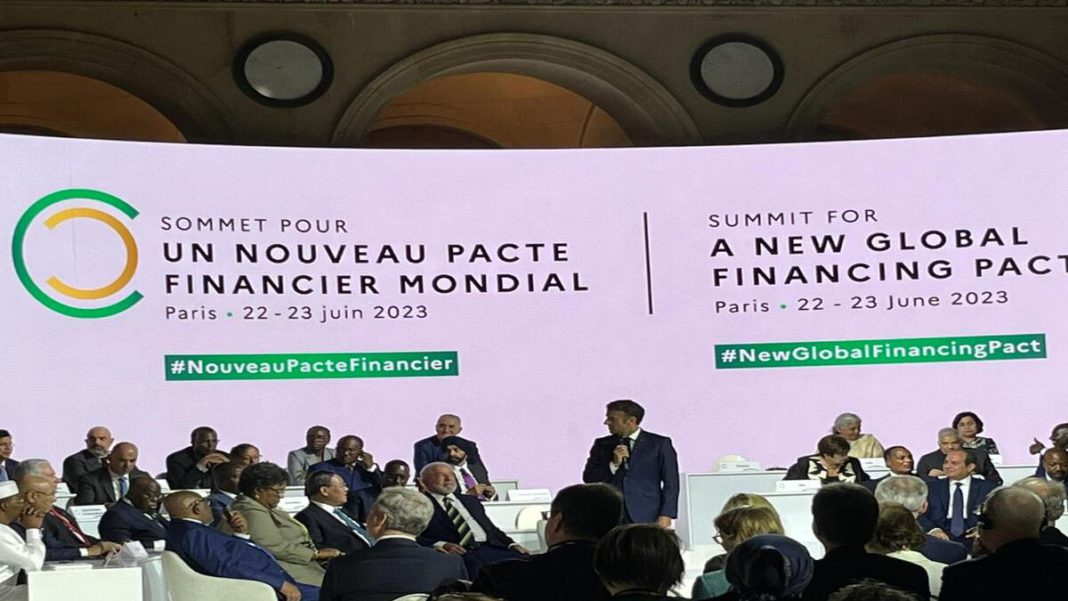FRANCE: At a global Finance summit in Paris, aid was offered to poorer nations grappling with a mounting debt crisis, but the plans fell short of the debt forgiveness programme that some had hoped for.
Progress was made on measures that would help address the climate emergency as about 40 world leaders and the chiefs of international organisations gathered in Paris for the summit, which concluded on Friday.
French President Emmanuel Macron called for international taxes on shipping, aviation, and possibly even wealth to pay for climate action.
“Help us find all the countries that today have no tax on financial transactions and which today have no tax on plane tickets. Help us to mobilise at the International Maritime Organization [meeting to discuss a shipping tax] in July so that there is international taxation,” he urged French broadcast journalists.
US Treasury Secretary Janet Yellen hinted that the Biden administration would take the shipping tax into consideration, but she refrained from endorsing it.
Ajay Banga, the World Bank’s incoming president, outlined a new vision for the organisation that would combine its traditional emphasis on helping people escape poverty with a focus on the climate problem, which threatens to halt growth.
He said, “In my opinion, the World Bank’s vision must develop to say, yes, we will create a world free of poverty, but on a livable planet, which means we must address climate change, pandemics, fragility, food insecurity, and other issues that limit our ability to have a good life and to be hopeful.”
However, campaigners for poverty and climate change claimed that few specific actions had been agreed upon during the summit that would have an immediate impact. As a result of rising interest rates and a strong currency, at least 52 countries are currently in a debt crisis and unable or almost unable to pay their debts back.
For nations experiencing a climate crisis, the World Bank will suspend debt repayments, but only for new loans. The UK will follow suit with its current loans, but only for 12 nations in Africa and the Caribbean.
Special drawing rights (SDRs), a unit of currency supplied by the International Monetary Fund, will provide approximately $100 billion (£80 billion) to poorer nations. Nations like France, Japan, and the UK pledged SDRs worth a total of around $80 billion. If the White House can win Congress’ support, an additional $21 billion might flow from the US.
“We have a success story,” the IMF’s managing director, Kristalina Georgieva, stated. “Something we promised was delivered.”
The SDR funding stands apart from the $100 billion in dedicated climate finance that poorer nations have been granted to assist them in reducing greenhouse gas emissions and preparing for the effects of the climate issue.
Each of them stands apart from the loss and damage fund, a brand-new fund that is being designed specifically to aid in the relief efforts for nations affected by climate calamities. At least a portion of the proceeds from a global shipping tax, which according to some estimates might bring in $5 billion a year, would go towards compensating for loss and damage.
The International Maritime Organisation will convene the following week to talk about the possibility of a new shipping tax. Ireland’s environment minister, Eamon Ryan, told a UK-based media portal that the choice would probably be carefully considered. “It’s 50/50,” he declared.
At the summit’s conclusion, world leaders decided they wanted a change in how the world approaches the funding required to help poor countries escape poverty, international aid, and climate catastrophe.
They also wanted a roadmap to be established for further debate on how to accomplish these goals. A fundamental tenet upon which all nations agreed was that trillions, not billions, of dollars, would be required in the financing, the majority of which would have to come from the private sector, with state funding serving as a catalyst.
They agreed that organisations like the World Bank and other development banks should try to “de-risk” investment in developing nations in order to increase the amount of money flowing to underdeveloped nations that desperately need it.
However, there were significant gaps between the rich and the poor, and there are still many unanswered questions regarding future policy, such as potential new global taxes on wealth, shipping, and aviation, as well as on fossil fuels.
Youth activists in Paris, such as Greta Thunberg and Vanessa Nakate, stated that the summit had missed the mark by ignoring the main cause of the issue, fossil fuels. Rich nations were urged to stop using fossil fuels and contribute to the cost of the global transition, but the summit scarcely touched on the subject.
“If your house is on fire, the first thing you do is stop pouring oil and gas on the fire. If you keep adding fossil fuels and funding more oil and gas, you are only fueling the flames,” said Thunberg.
Also Read: Fatal Titan Submersible Incident Sparks Inquiry by Canadian Safety Regulators



